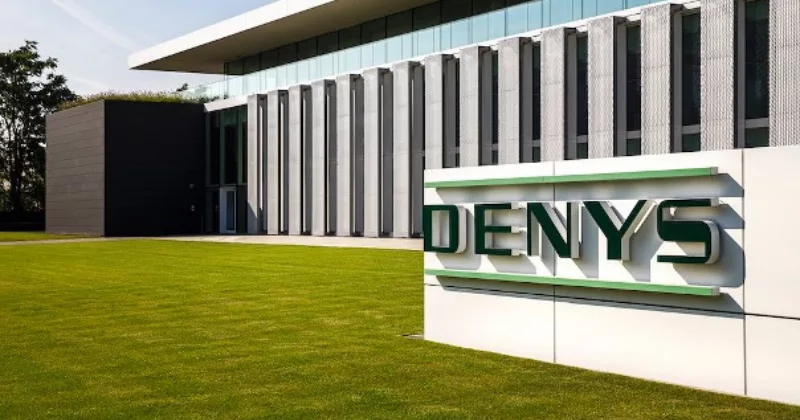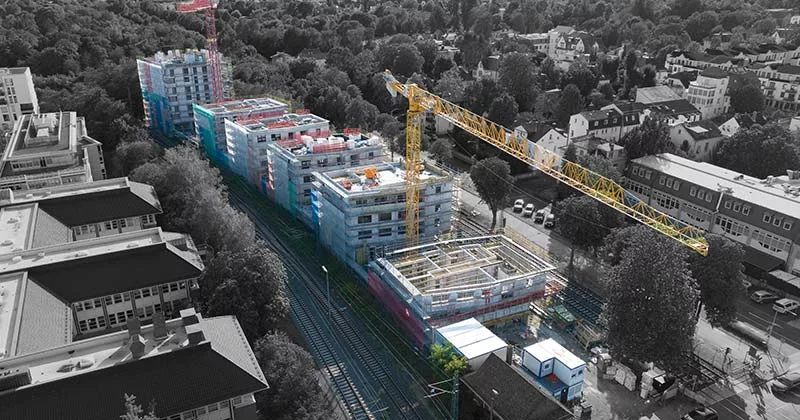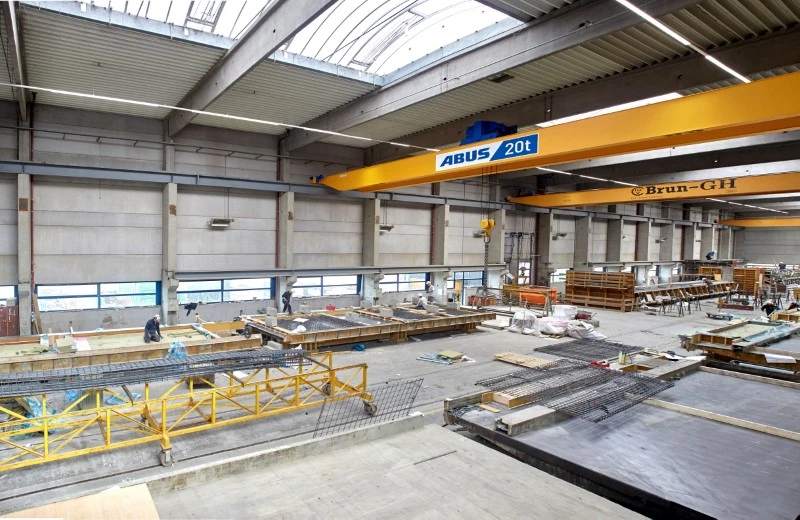
Construction Scheduling Software
A critical part of a construction project is scheduling and resource management, which can be handled effectively with the right construction scheduling software. The resourcing capabilities that these tools possess enable construction schedulers to assign labor, materials, and equipment to tasks based on real-time data. This ensures that the right resources are available when needed. These software solutions also provide real-time insight into project progress and resource availability, allowing professionals in the building industry to make more informed choices, work more efficiently, avoid waste, and guarantee projects are finished on time and within budget.

Powerful Construction Scheduling Software at Your Fingertips
With RIB’s construction resource management software, project managers can create detailed, real-time project schedules, incorporating tasks, deadlines, and dependencies in a way that ensures every phase of the project stays on track. Our software solutions include automated schedule changes integrated with resource management, allowing teams to effectively allocate labor, supplies, and equipment depending on project requirements. Below, you’ll find more details about our solutions.
RIB Candy
Providing a powerful critical path network designed specifically for the built environment, the planning and scheduling tools within RIB Candy are designed to be used effectively by non-planners and professionals alike. Together with RIB Candy Estimating, a user also has access to cash flow analysis and cost/value forecasts, as well as a variety of resource histograms.
RIB Candy provides planners with a powerful tool to link time, money and cost for accurate planning, forecasting, and cash flow projection. This ensures that planners and contractors can preplan, schedule and optimize resources with speed.
- Resource planning, allocation, histograms and leveling in one easy system.
- Long Lead and Information Schedules for tracking and recording off-network operations and responsibilities.
- The resources used in the BOQ analyzed against the program can also be plotted as histograms. Changes to either the program or the estimate will immediately be reflected in the forecast and/or histogram.
- Estimate information is available in the program for accurate Forecasting and Cash Flow analysis.

RIB 4.0
RIB 4.0 is powerful construction scheduling software that allows you to efficiently manage and monitor operations, schedules, and resources in real-time throughout the entire lifecycle of your construction project. This innovative solution combines proven tools, such as the Gantt chart, with the latest location-based information and seamlessly integrates with modules for modeling, estimation, and procurement.
RIB 4.0 connects BIM models with time and cost data to help contractors and subcontractors plan activities, monitor resource allocation and optimize cost. You can build faster, smarter and greener using intelligent real-time data.
- Centralize the resource management process to eliminate information silos
- Allocate the right resources at the right time
- Leverage 5D simulation to reduce rework and risk.

What Our Clients Say
Construction Scheduling Software FAQs
Construction scheduling software is a digital tool that streamlines the generation of schedules and the allocation of resources in construction projects. It centralizes all project information, ensuring stakeholders are informed and can collaborate effectively.
These solutions eliminate paper or spreadsheet-based schedules, opening the door for better accessibility, collaboration, and productivity in construction projects. They allow companies in the building industry to not just generate a schedule that is effective and has no overlaps, but also to track the different activities in real-time, assign specific tasks to the different teams, track deadlines, and centralize all project data, setting the perfect environment for enhanced communication and collaboration between stakeholders.
The construction industry still faces the reality of most projects not being finalized within the expected time, leading to them running over budget. This is mainly due to unexpected challenges or issues that are the result of poor planning and a lack of collaboration. That is where modern construction project scheduling software comes into the picture. These solutions offer the perfect digital environment to generate, manage, and streamline project schedules to ensure they can be finalized within the expected timeline and with better results. Some of the key benefits of these solutions include:
- Centralized project data: Construction projects are composed of many processes and people that must collaborate to ensure success. Scheduling software provides a centralized location for all project information, ensuring everyone is informed about any changes or developments and avoiding mistakes or reworks due to misinformation. Having all information and documentation in a single place also helps build a schedule that considers the whole picture, ensuring no tasks or processes overlap.
- Data-based decision-making: Another benefit of these software solutions is the ability to base any decision on data. In today’s complex construction landscape, decision-makers cannot afford to trust their experience and intuition when it comes to scheduling. Using data to make strategic decisions can help avoid issues and ensure the project remains on time and within budget.
- Better transparency and collaboration: By providing the necessary features to plan schedules and connect the different disciplines, these platforms enhance transparency and collaboration between teams, two things that are fundamental to ensuring the end result meets quality, time, and budgetary expectations.
- Enhanced productivity: With all planning processes optimized with the help of construction resource planning software, teams don’t need to waste time looking for information, waiting for email responses, or trying to figure out what their next task is. These solutions provide a high level of visibility that allows teams to focus on completing their assignments, which translates into increased productivity.
- Increased profitability: Arguably, one of the most important benefits of these solutions is increased profitability. By solving the most common challenges that come with scheduling and resource allocation, projects are most likely to reduce the risk of issues or rework, which results in increased profitability.
There is a common misconception that scheduling software for construction is just a tool that aids in planning. This might have been true in the past, but it is certainly not true today. As technology develops, these solutions have become more specialized and complete, offering functionalities ranging from project management, resource allocation, risk assessment, real-time progress monitoring, and more. Some of the key functionalities the best construction scheduling software should have include:
- Advanced scheduling: The best software out there should offer advanced functionalities to generate and visualize the project schedule. For instance, RIB Candy allows users to maintain a detailed precedence network to understand the dependencies and relationships between the different activities, ensuring a smooth workflow. Comments and notes can be added to the different activities to provide additional valuable information.
- Resource management: Another invaluable feature these solutions should offer is the ability to categorize resources and allocate them to the different activities in the schedule to analyze the project’s resource requirements.
- Mobile access: Another crucial functionality you should look for before investing in these tools is the ability to access and update the status of different tasks and activities from a mobile phone or tablet on site. This will allow teams to upload photos, send documentation, or fill out forms to avoid unnecessary delays.
- Document management: These tools must include the ability to manage all documentation in a single place. Centralizing all documents, including contracts, permits, construction specifications, and more, ensures that no information is missed in the decision-making process while boosting collaboration.
- Real-time tracking: The best scheduling software should provide real-time progress tracking to ensure any issues can be resolved early on. For example, RIB Candy offers the possibility of comparing the original schedule with the as-built progress report to compare the initial expectations with actual progress.
- Integration: Budget and schedules need to be integrated to make the best decisions for the project. These solutions should allow you to link the items from the BoQ with the different activities, allowing information from the estimate to be reflected against the time frame calculated in the schedule.
Researching scheduling software to invest in is not easy. There is not a one-size-fits-all solution out there. It actually depends on your organization’s needs and objectives. That is why you should first start by identifying your teams’ needs and requirements and what functionalities they are missing to improve their workflows. You should also consider any budgetary constraints, as these solutions are usually not free, with different packages and licenses being offered.
Once those two considerations have been answered, you can start researching your software. Integration with other systems is also fundamental as it will ensure no data is lost and that the tool can integrate into your current operations without having to change a lot of things, which can take time, and time is not abundant in the building industry.
Lastly, you should take advantage of free trials and demos, as this is the best way to actually test the software and ask the provider all the hard questions. At RIB Software, we offer a free demo to allow potential users to test our toolkit of solutions and see for themselves what is the value of our offerings.
Many of the rework and schedule delays in construction projects happen mainly because teams are not connected. A discipline might start a task without knowing that a change has occurred or that the previous step is not complete yet. Specialized scheduling software solves these issues by having collaboration at its core. It provides a centralized platform for document management and communication, which reduces the risk of misunderstandings that can lead to rework.
It also provides real-time progress tracking, which allows the different teams to be informed about the development of various processes and collaborate to carry them out successfully. These solutions also promote accountability by assigning tasks to specific people and teams, which can also promote collaboration in construction projects.
Budgets and schedules go hand in hand in construction projects, as any issues or delays in the timeline will naturally affect the budget. Scheduling software aids in construction budget management by integrating timelines with budgetary elements to analyze the impact that delays or changes have on the budget. It also provides progress tracking that allows users to spot any issues or potential delays in real-time, giving enough space to mitigate the impact on the budget.
These solutions also include features to track labor hours, material costs, and other expenses, which also helps keep a close spending record. Overall, the data provided by scheduling platforms allows users to streamline the financial implications of the timeline to ensure the project remains profitable.











